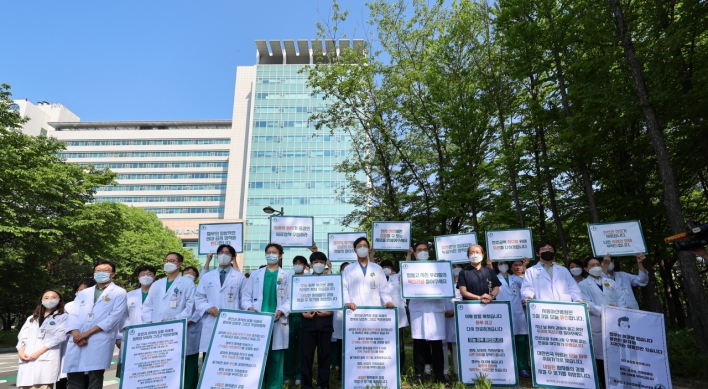Caffe Bene, a leading local coffee chain, announced Dec. 30 that a private equity fund has become its largest shareholder.
“The fifth K3 Fund, a private equity fund, has taken an 84.2 percent stake in the coffee chain,” a company official said.
Industry watchers said the ownership change in the homegrown coffee chain is expected to lighten its strained finances by lowering the company’s debt ratio to 300 percent from the previous 865 percent.
The change in governance not only highlights the dire financial situation at Caffe Bene, but also marks the downfall of Kim Sun-kwon, the founder and chairman of the company.
“The fifth K3 Fund, a private equity fund, has taken an 84.2 percent stake in the coffee chain,” a company official said.
Industry watchers said the ownership change in the homegrown coffee chain is expected to lighten its strained finances by lowering the company’s debt ratio to 300 percent from the previous 865 percent.
The change in governance not only highlights the dire financial situation at Caffe Bene, but also marks the downfall of Kim Sun-kwon, the founder and chairman of the company.

Though Caffe Bene said Kim will focus on its overseas operations, industry insiders expect him to resign, as his stake has shrunk to 7.3 percent from 49.5 percent.
The news has also alarmed many start-ups, as Kim was hailed as the epitome of Korean style entrepreneurship.
The 47-year-old businessman established the first cafe called Caffe Bene in April 2008 in Cheonho-dong, eastern Seoul. It came several years after he led the success of Chupungryeong Gamjatang, a pork and potato broth restaurant in the neighborhood, which he nurtured into a nationwide franchise with more than 320 outlets in the country.
Based on the experience from his first venture, he understood the importance of marketing, and used celebrity endorsements for promotions from the very beginning of his second start-up business, alongside product placements on popular TV shows.
Added to the growing demand for “coffee shops in the hood,” Caffe Bene opened 335 outlets in 2010, and opened its 800th the following year. The company also had around 500 overseas outlets in the U.S., China, Taiwan, Indonesia, Saudi Arabia, Malaysia and others at its heyday.
Excessive diversification
After the success of Caffe Bene, Kim explored several other businesses based on debt financing. This seemed essential at the time because the Fair Trade Commission restricted large coffee shop franchises from opening new outlets in areas where small coffee stores already operate. This put a tremendous strain on the business.
In 2011, he launched Italian-themed casual diner chain Black’Smith and acquired mid-weight bakery brand Mainz Dom in 2012. He also opened a large cosmetics curation store on Dec. 24 the same year in the lucrative area of Gangnam, southern Seoul, and launched budget coffee store Baristella in 2015.
However, none of them were as successful as Caffe Bene.
He had to sell Black’Smith and Mainz Dom due to mounting criticism that the market dominance of large franchises was killing off small businesses.
The cosmetics store also failed to attract popular brands and tanked within several months, while Kim had to shut down Baristella after facing huge resistance from Caffe Bene franchisees who complained about the conflict of interest.
His overseas operations also turned out to be less than impressive.
The businesses in the U.S. and China were deep in the red, and many stores had to be shuttered. Rumors had it that the company’s Chinese partner severed business ties, leaving the local operations in a complete black hole.
Caffe Bene posted 146.3 billion won ($123.2 million) in sales in 2014, and operating profits of a mere 3.1 billion won. The company sold its headquarters building in southern Seoul last year for 36.3 billion won for liquidation. Kim tried his best to revive the coffee chain’s fortunes by appointing Choi Seung-woo, a former Woongjin CEO, as the new head, and invited private equity funds to invest in his business.
Some say that Kim may have been too aggressive. He became the target of public antipathy when he wrote for local Chosun Ilbo newspaper urging the youth suffering from unemployment to “stop complaining and face challenges,” which was branded as an insensitive sermon.
An alliance of part-time workers retorted that 93.8 percent of Caffe Bene outlets violate several labor laws, including sexual harassment prevention training and notification of minimum wage and labor contracts, among others.
“Instead of asking the youth to stop complaining and take up challenges, he should abide by the law so people stop complaining,” an alliance member stated.
Caffe Bene was also fined for hiring bloggers for advertorials without notifying the readers about the nature of the paid articles, and was investigated for mandating franchisees pay for expensive decorations.
Shifting to hamburger business
After selling Caffe Bene to the PEF, Kim has reportedly started another business as an investor rather than as manager. He has joined hands with Tony Hong, a Korean Master Chef contestant, and opened Tony Burger in the affluent Gangnam district in December.
The American-style burger shop infused with Korean celebrity fandom has already received favorable reviews from gourmets.
“We never know. Kim is the role model for many emerging Korean entrepreneurs. He may return very soon,” a person close to the Caffe Bene issue said.
By Bae Ji-sook (baejisook@heraldcorp.com)
-
Articles by Korea Herald










![[K-pop’s dilemma] Time, profit pressures work against originality](http://res.heraldm.com/phpwas/restmb_idxmake.php?idx=644&simg=/content/image/2024/05/08/20240508050705_0.jpg&u=20240508171126)








